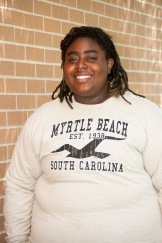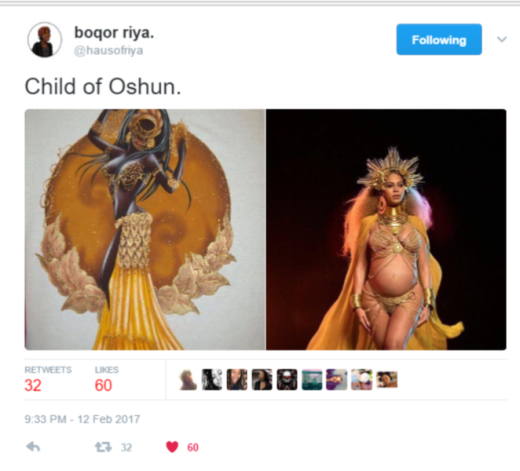Making Space for Faith in Feminism
 A reflection by Michael Jalloh-Jamboria, Women’s Center student staff member
A reflection by Michael Jalloh-Jamboria, Women’s Center student staff member
Saturday, February 12th was the 59th Grammy awards show. The show featured many musical performances and winners, most notably,Beyoncé. At the time of her performance, not only was she pregnant, but she delivered a kickass performance, defied gravity, all the while channeling some major West African, Latin American, and Christian spiritual imagery during her performance.
In both Santeria and West African spirituality, the Goddess Oshun is the goddess of sweet waters–the embodiment of love, fertility, and sensuality. Her love and guidance were instrumental to the creation of the world, so much so that other Orisha (gods and goddesses) were unable to complete their work on earth without Oshun. After Beyonce’s amazing performance, Twitter was going wild with the comparisons between Beyoncé and the goddess Oshun.

Beyoncé’s performance, her golden outfit, the fact that she was very pregnant, and the influx of Twitter comparisons reminded me of an earlier blog post I had written about my journey of religion and its intersections with my identities. Growing up, my parents loved to tell me stories of the Orisha, or gods and goddesses, and how they created the earth. While I was raised Muslim, my parents never separated our West African spirituality from our Muslim religion. Beyoncé’s performance got me thinking about how different my religion is from my spirituality. While it can be a strange balance, both my religion and my spirituality are important aspects of my identity. But I realized, within the social spaces I occupy, I don’t really talk about those parts of my identity. From there, I began to think about whether or not religion has a place in feminism.
I’ve felt like I can’t talk about my religion and spirituality in feminist and social justice oriented spaces. I’ve been talked over and shut down when I’ve decided to share the ways in which my beliefs have helped me in my expansion of feminist knowledge and activism.
Believe me, I get it. The patriarchy is everywhere! It would be naive to think that religion is exempt from the influences of male supremacy and systematic oppression. But it is important to remember that religious feminists aren’t free from that oppression. We don’t get a pass because we follow that particular faith. None of us can ignore the ways that the perpetuation of sexist interpretations affect us in religious spaces.
Religious feminists have had to grapple with our religion and our identity as feminists. We are cognizant of when and how to speak out against oppression. We work within a system of naysayers and oppressors just to get access to some of the resources that others have. There is still so much work to be done, and the treatment of religious feminists as other hurts everyone, regardless of their religion.
Coalition building between religious and non-religious folks is important. At a time where religious freedom is being targeted, it’s important to make sure that intolerance is not being perpetuated anywhere, but especially within feminist and social justice oriented spaces.
It’s strange to think that religion could shape some of my feminist beliefs. But actually, as I reflect on some of the basic pillars of Islam, there are parallels with how I engage in activist spaces and feminism. For me, simple everyday good deeds turned into wanting to do good for others, especially those less privileged then me. My activism is driven by the thought that putting good energy into the world will be returned. My feminism is filled with love for people, their identities, their lives and their needs, similar to the way that my faith has taught me to love my neighbor and fellow human beings!
During this time of chaos and violence, I’ve also been interested in the crucial ways religion and spirituality helps us heal. After the presidential election, many of us took some time to care for ourselves. For some of us, healing was eating, being angry, planning for the difficult times to come, or crying. While for others, healing included asking our elders how we should proceed, bowing our heads to ask for guidance, lighting a candle or two (or 50), or crying (there was a lot of crying.) No matter how we did it, we all needed to heal and digest the situation before we could get back to our kickass activism. Also, some of us are still healing, and that’s totally valid! Recognizing that our communities needed (or still need) some down time is important as we try to create space for those of different faiths. Similarly, feminists that assume that their religious counterparts are dismissive of social justice issues within their own faith is hard work but it can be done.
While some of us use the power of Beyoncé’s music to heal and process, it’s important to make space for those of us who heal, learn and pray in different ways. As our understanding of feminism and social justice expands, we must continue to incorporate intersectionality into the way we engage with each other.
For more work on the intersections of feminism and Muslim identity, check out “My Hijab Has Nothing To Do With Oppression. It’s A Feminist Statement“. Also, what is the status of women as religious leaders within the US? Check out his Huffington Post article to find out more!
Posted: March 6, 2017, 12:00 PM